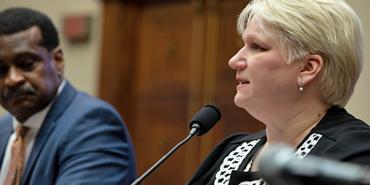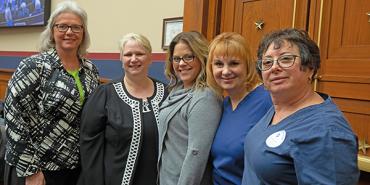For more than three years, Patt Moon-Updike was unable to talk publicly about the violent assault that ended her career as a nurse. She promised her union, the Wisconsin Federation of Nurses and Health Professionals, that when she was ready, she would do what she could to help other health professionals by telling her story. It was the recent murder of a nurse at the hospital where Moon-Updike’s life was saved after her own traumatic workplace injury that moved her to speak up. “It just lit a fire in me,” she says.
That fire is what brought Moon-Updike, a psychiatric nurse, to Washington, D.C., on Feb. 27 to testify before the U.S. House of Representatives Committee on Education and Labor’s Subcommittee on Workforce Protections, in support of recently introduced legislation that could provide vital safety measures for healthcare professionals.
Rep. Joe Courtney (D-Conn.) introduced the Workplace Violence Prevention for Health Care and Social Service Workers Act (H.R. 1309) on Feb. 20 that would require the Occupational Safety and Health Administration to develop enforceable safety standards for frontline healthcare and social service workers, who are five times more likely to be assaulted at work than the rest of the labor force.
“Healthcare and social service workers do important, lifesaving work. The least we can do is ensure that they can come home safe at the end of their workday,” said Rep. Alma Adams (D-N.C.), the subcommittee chairwoman during the hearing. “We need to ask ourselves: What is the price of inaction?”
AFT members know the price of inaction all too well.
In her testimony, Moon-Updike told the lawmakers about her assault at a county mental health facility by a patient with a history of aggression. He kicked her in the throat, collapsing her trachea, requiring surgery.
“All I remember is sitting in a chair, not being able to breathe, holding on to my trachea for dear life; I just knew if I let go, it would collapse and I would die right there in that hallway,” said Moon-Updike. The injury left her with lifelong injuries and post-traumatic stress disorder; she can no longer work in healthcare.
“I loved being a nurse. I do not know what to call myself now,” Moon-Updike said. “There is a deep loss when you used to make a difference in the lives of people, in your true calling and passion, and in that place is extreme sadness and fear. The assault that happened to me was not a random or freak event, but a predictable scenario that could have been prevented had there been a plan in place and more trained staff there to assist.”
Moon-Updike was joined by fellow AFT nurse members from across the country who came to Washington to share their own experiences with workplace violence.
“It’s an honor to be here and to meet people and hear what’s happening in the government to help us,” said Susan Harper, a member of the Ohio Nurses Association, who was among the group of AFT nurses attending the hearing. Harper has been a psychiatric nurse since 1975. She was attacked by a patient and suffered a concussion that kept her out of work for nearly a month. For Harper, lending her voice to the call for this legislation is about standing up for her family. “I am happy that the union is involved in getting this done because my children are also nurses,” she said. “I just can’t imagine why this legislation wouldn’t pass.”
“It’s exciting to be here,” said Adrianne Harrison, who made the trip to Washington from Montana. “Taking part in this makes me feel empowered,” said Harrison, a member of the Montana Nurses Association. Harrison, a psychiatric nurse, said she has been spit on, verbally threatened and was more seriously hurt in 2014 by a patient who pushed her into a wall. “I’ve always been involved in my union, but after my assault I got more involved. One of the best things about being part of the union is that you are not alone.”
Harrison wants hospitals to be proactive, not reactive, when it comes to workplace violence. “Healthcare workers need those tools. When you’re afraid, it affects the way you do your job.”
Barbara Walsh, a psychiatric nurse who is a member of Health Professionals and Allied Employees in New Jersey, has been assaulted three times in her 16 years on the job. Walsh was left with long-term injuries, including a traumatic brain injury, loss of range of motion of her neck, loss of vision, memory issues and PTSD. “This bill is a godsend. It’s for everyone; every patient would be safer, and that’s why I’m here. My story is not an isolated one—but maybe it will be in the future.”
For Moon-Updike, the legislation is not just lip service. “It puts protocols in place to provide the equipment, personnel and training we need to do our jobs safely.”
Moon-Updike points to a code of silence when it comes to workplace violence in healthcare settings. “You suck it up, and you don’t report because the hospital is not going to have your back.” But, she said, “We’ve been quiet way too long, and hospital administrations have benefited from that. They won’t change unless we force them to. The violence needs to stop. I’m willing to be the squeaky wheel.”
That’s why the AFT is one of the loudest voices supporting this bill: Violence should never be part of the job.
“Our nurses and health industry workers care every day for the sick, the elderly and the mentally ill,” said AFT President Randi Weingarten, “yet they often feel unsafe or unprotected themselves from the assaults that occur in hospitals and other healthcare-related settings.”
“No one should face violence, intimidation or fear for their safety while they’re on the job. And as a union of healthcare professionals, educators and public employees, we welcome this effort to finally make federal workplace-safety regulations a priority,” said Weingarten. “Without a standard to address violence in healthcare, it will continue to go unchecked.”
Contact Congress and tell lawmakers to pass the bill.
[Adrienne Coles]


